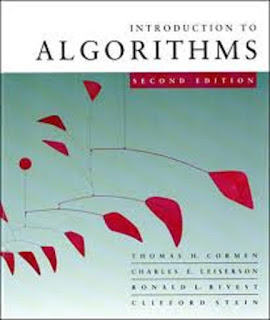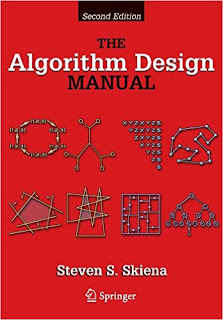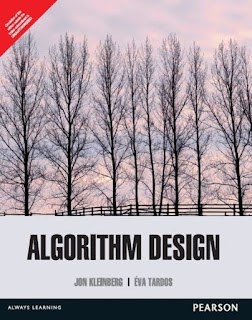Top 10 Algorithm books Every Programmer Should Read
Algorithms are language agnostic, and any programmer worth their salt should be able to convert them to code in their programming language of choice. Unfortunately, I have come across several programmers who are REALLY good on programming languages like Java or Python like knows minor details of API and language intricacies but have very poor knowledge of fundamentals Algorithms and Data Structure. Just ask them to implement any popular sorting algorithms like quicksort or merge sort, and they will fall apart. If you expect them to know more advanced and sophisticated algorithms like String processing algorithms, graph algorithms, tree traversal, or greedy algorithms, be ready to check on Interviews; otherwise, you might end up with some surprises.
Once, I come across a perfect candidate for a core Java senior developer role, He who was excellent in Java, multi-threading but his data structure and algorithm skill was penniless to his experience and caliber.
When I asked him why he didn't spend time brushing his algorithm and problem-solving skill before coming to the interview? His excuse was, "those algorithms are just for meetings and never really used in practical coding. I have never used them in my 6 years of Java development career. "
He was somewhat right; you don't need to implement a hash table in Java; you can always use the HashMap class or Dictionary in Python for that sense, but he failed to recognize the more long term improvement algorithm and data structure do in improving programming skill.
Algorithms are tools of developing programming solving skills and coding sense, which is required to convert a user requirement into the line of code, also known as a computer program.
They are also all around, if you use Facebook, have you ever thought about how they find your friends so quickly? Or how does Netflix recommends the movie you want to watch? Those are just a couple of examples of Machine Learning Algorithms, which are taking Algorithms into another level.
Programming languages come and go, but the core of programming, which is algorithm and data structure remains the same.
If you know how a hash table works, then you can use their implementation in any programming language like HashMap from JDK, Dictionary in Python, or HashMap from the C++ boost library.
So, if you are serious about programming and realizing it now that algorithms and data structure is not optional, here are some of the great books to learn algorithms.
Some of you might have already read them before, but they are worth reading again.
It's not possible to finish this book in one sitting, and some of you may find it difficult to read as well, but don't worry, you can combine your learning with an online course like Data Structures and Algorithms: Deep Dive Using Java along with this book.
This is like the best of both worlds, you learn basic Algrotihsm quickly in an online course, and then you further cement that knowledge by going through the book, which would make more sense to you now that you have gone through a class already.
Another reason I recommend this book as one of the first books on algorithm because of its language agnostic and accompanied by lectures here
There's also a couple of free Coursera online courses for this book, Algorithms Part 1 and Algorithms Part 2, which nicely complements this book. It's excellent. It's also my top recommendation to Java programmers for learning algorithms.
Believe it or not, but if you already know a programming language, then seeing an example of an algorithm on that programming language than others also reduces the learning curve. You can also read the 4th Edition of this book online for free here.
The code is in C, but it's not very esoteric, and it's easy to follow. I had also been out of school for a while, and this helped me get up to speed quite quickly on several graph algorithms. I've had this for almost 10 years now and still look at it from time to time.
The cover itself shows how unusual the book could be if you look at the image carefully on the cover is drawn with thumbnails of famous people, and the book explains how you can develop such algorithms. Interesting, isn't it?
Well, I like this book because of its approach and objective, sometimes learning the same thing with different object helps to understand it better.
All algorithms are presented in pattern form, with a motivation to use them, pictures and pseudo-code giving a high-level overview, and working code (in C, C++, Java, and Ruby).
They also have benchmarks to provide proof of the theoretical performance of the algorithms. In short, one of the best books to learn algorithms for programmers.
It's more about algorithm design for developers familiar with the basic algorithms. You should start with the Introduction of Algorithm book or Algorithms by Robert Sedgewick and then continue with this book.
Btw, if you like, you can also combine your learning with an online course like Algorithms and Data Structures - Part 1 and 2 on Pluralsight. It's an excellent course to get familiar with essential Algorithms and Data Structure before you move on to the Algorithm Design topic.
Btw, if you find this book challenging to read, which is what some of my readers complain, then you can also take a look at the Grokking Algorithms by Aditya Bhargava, one of the easiest and exciting books on Algorithms for beginners.
As I have told that algorithms are language-independent; learning python algorithm doesn't mean you cannot implement them in Java or C++, but if you already know Python, then this is an excellent book to learn computer algorithms.
This book also gives a lot of focus on Graph Algorithms, which is very useful in solving real-world problems.
That's all about 10 Algorithm books every programmer should read. I agree that algorithms are a complex topic, and it's not easy to understand them in one reading; in that case, I suggest to read the same book twice.
Also, just reading is not enough, try to implement them in a programming language you love. It doesn't hurt writing your own ArrayList, HashMap, or a tree-based Map implementation. Effect of learning Algorithm is not immediately visible, but you will notice a subtle improvement in your thinking, solution building, and code quality over time.
Once, I come across a perfect candidate for a core Java senior developer role, He who was excellent in Java, multi-threading but his data structure and algorithm skill was penniless to his experience and caliber.
When I asked him why he didn't spend time brushing his algorithm and problem-solving skill before coming to the interview? His excuse was, "those algorithms are just for meetings and never really used in practical coding. I have never used them in my 6 years of Java development career. "
He was somewhat right; you don't need to implement a hash table in Java; you can always use the HashMap class or Dictionary in Python for that sense, but he failed to recognize the more long term improvement algorithm and data structure do in improving programming skill.
Algorithms are tools of developing programming solving skills and coding sense, which is required to convert a user requirement into the line of code, also known as a computer program.
They are also all around, if you use Facebook, have you ever thought about how they find your friends so quickly? Or how does Netflix recommends the movie you want to watch? Those are just a couple of examples of Machine Learning Algorithms, which are taking Algorithms into another level.
10 Algorithm Books - Must Read for Developers
Another gold tip to those who think that Algorithms are Data Structures is for those who want to work in Amazon, Google, Facebook, Intel, or Microsoft; remember it is the only skill which is timeless, of course, apart from UNIX, SQL, and C.Programming languages come and go, but the core of programming, which is algorithm and data structure remains the same.
If you know how a hash table works, then you can use their implementation in any programming language like HashMap from JDK, Dictionary in Python, or HashMap from the C++ boost library.
So, if you are serious about programming and realizing it now that algorithms and data structure is not optional, here are some of the great books to learn algorithms.
Some of you might have already read them before, but they are worth reading again.
1. Introduction to Algorithms by Thomas H. Corman
This is one of the most popular algorithm books, but be aware that it contains a heavy dose of theory. The current edition of this book is 3rd Edition, and I strongly suggest that every programmer should have this in their bookshelf, but only for short reading and references.It's not possible to finish this book in one sitting, and some of you may find it difficult to read as well, but don't worry, you can combine your learning with an online course like Data Structures and Algorithms: Deep Dive Using Java along with this book.
This is like the best of both worlds, you learn basic Algrotihsm quickly in an online course, and then you further cement that knowledge by going through the book, which would make more sense to you now that you have gone through a class already.
Another reason I recommend this book as one of the first books on algorithm because of its language agnostic and accompanied by lectures here
2. Algorithms by Robert Sedgewick & Kevin Wayne
This was my preferred resource on algorithms for a long time, it still is, but now I see it less often than before. You will learn lots of background on the algorithm, and nowadays, even specific versions of this book are available for different programming languages like Java and C++.There's also a couple of free Coursera online courses for this book, Algorithms Part 1 and Algorithms Part 2, which nicely complements this book. It's excellent. It's also my top recommendation to Java programmers for learning algorithms.
Believe it or not, but if you already know a programming language, then seeing an example of an algorithm on that programming language than others also reduces the learning curve. You can also read the 4th Edition of this book online for free here.
3. The Algorithm Design Manual by Steve S. Skiena
This is another excellent book on computer algorithms that go over a ton of algorithms with a lot of code as well. What I especially like about the book is where he actually gives examples of where he used the algorithms (or variations thereof) in practice; it really helps you see the class(es) of problems that a particular algorithm (or family of algorithms) can be used for.The code is in C, but it's not very esoteric, and it's easy to follow. I had also been out of school for a while, and this helped me get up to speed quite quickly on several graph algorithms. I've had this for almost 10 years now and still look at it from time to time.
4. Algorithm for Interviews
Algorithm for Interview by Adnan Aziz is a must-read book on algorithms, written in terms of keeping programming interview in mind.The cover itself shows how unusual the book could be if you look at the image carefully on the cover is drawn with thumbnails of famous people, and the book explains how you can develop such algorithms. Interesting, isn't it?
Well, I like this book because of its approach and objective, sometimes learning the same thing with different object helps to understand it better.
5. Algorithm in Nutshell
O'Reilly's Algorithms, in a Nutshell, is an excellent book to learn programming algorithms, especially for Java programmers. It describes the algorithms with a focus on implementing them and without heavy mathematics used in classic books on algorithms.All algorithms are presented in pattern form, with a motivation to use them, pictures and pseudo-code giving a high-level overview, and working code (in C, C++, Java, and Ruby).
They also have benchmarks to provide proof of the theoretical performance of the algorithms. In short, one of the best books to learn algorithms for programmers.
6. Algorithm Design by Kleinberg & Tardos
This is actually the second-best book in Algorithms after Thomas Cormon's Introduction to Algorithms. It's not really an introduction to algorithms and more suited to experienced programmers.It's more about algorithm design for developers familiar with the basic algorithms. You should start with the Introduction of Algorithm book or Algorithms by Robert Sedgewick and then continue with this book.
Btw, if you like, you can also combine your learning with an online course like Algorithms and Data Structures - Part 1 and 2 on Pluralsight. It's an excellent course to get familiar with essential Algorithms and Data Structure before you move on to the Algorithm Design topic.
7. Introduction to Algorithms: A Creative Approach
Introduction to Algorithms: A Creative Approach By Udi Manber is another excellent book for self-study as it is full of hundreds of problems and examples. It is designed to enhance the reader's problem-solving abilities and understanding of the principles behind algorithm design, which will help you to develop your Problem solving and Coding skills.8. The Design and Analysis of Algorithms
This is another great cook on computer algorithms and deserves a place in a programmer's shelf. Once you've gone through the Coursera class on Algorithms and one of the intro book, you can read this book for studying advanced topics in algorithms.9. Data Structures and Algorithms. Aho, Ullman & Hopcroft
Another good intro book on algorithms and data structures. A lovely and bright book and any programmer who doesn't like heavy use of Mathematics on the algorithm will appreciate this book.Btw, if you find this book challenging to read, which is what some of my readers complain, then you can also take a look at the Grokking Algorithms by Aditya Bhargava, one of the easiest and exciting books on Algorithms for beginners.
10. Python Algorithms: Mastering Basic Algorithms in the Python Language
This book is designed for Python programmers. Magnus Lie Hetland is also the author of one of the popular introductory Python book, Beginning Python.As I have told that algorithms are language-independent; learning python algorithm doesn't mean you cannot implement them in Java or C++, but if you already know Python, then this is an excellent book to learn computer algorithms.
This book also gives a lot of focus on Graph Algorithms, which is very useful in solving real-world problems.
That's all about 10 Algorithm books every programmer should read. I agree that algorithms are a complex topic, and it's not easy to understand them in one reading; in that case, I suggest to read the same book twice.
Also, just reading is not enough, try to implement them in a programming language you love. It doesn't hurt writing your own ArrayList, HashMap, or a tree-based Map implementation. Effect of learning Algorithm is not immediately visible, but you will notice a subtle improvement in your thinking, solution building, and code quality over time.
Btw, if you are interested in an online course on algorithms, I suggest you check out Data Structures and Algorithms: Deep Dive Using Java on Udemy. It's not a free course, but you can buy in just under $10 on several of Udemy flash sales, which happens every few days.
At last, there are two types of programmers, one who understands the algorithm and one who doesn't.
Source:Read more: https://www.java67.com/2015/09/top-10-algorithm-books-every-programmer-read-learn.html#ixzz6ILds6MRA










No comments:
Post a Comment